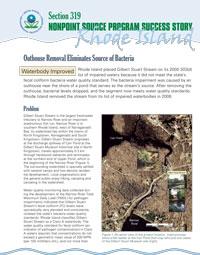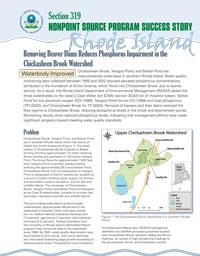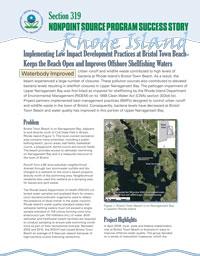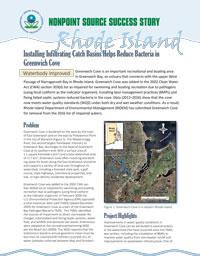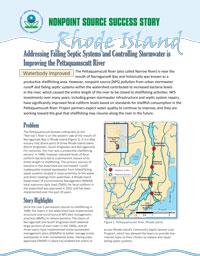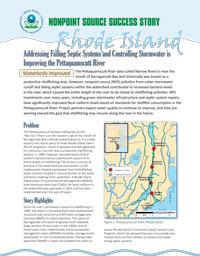Water Quality - Nonpoint Source Pollution
Aquidneck Island Watershed Plan
NOTICE: The Draft Aquidneck Island Watershed Plan is now available for public comment. DEM is actively seeking feedback and comment until November 7, 2025. Please send written comment to: jacob.peterson@dem.ri.gov
2024 Nonpoint Source Program Management Plan
As part of its core program objectives, the OWR Nonpoint Source Program has developed the 2024 Nonpoint Source Program Management Plan that guides the Program’s priorities and objectives for the five-year period from 2025-2029 and follows up on the 2019 Program Management Plan.
Protecting and restoring the waters of the State – surface water, groundwater and wetlands – from pollution due to nonpoint sources continues to be an important focus of state water pollution control programs in Rhode Island. Managing nonpoint sources (NPS) of pollution – those that cannot be tracked to a single pipe or discharge point, such as overland stormwater runoff and failing septic systems – is challenging. Available monitoring data reveal nonpoint pollution as a widespread problem affecting every watershed in the State. Nonpoint sources are suspected of contributing to the impairments in a majority of the surface waters included on the state's impaired waters list, also known as the 303(d) list.
To prevent and combat NPS pollution, the Rhode Island Department of Environmental Management (DEM) Nonpoint Source Pollution Management Program encourages various actions by state and local governments, businesses, watershed groups and individual landowners. The NPS Program uses the watershed approach to focus on managing nonpoint pollution problems. The DEM NPS Program activities are guided by the RI Nonpoint Source Management Program Plan (2019) as well as federal Environmental Protection Agency (EPA) requirements governing Clean Water Act (CWA) Section 319 funds. In accordance with federal NPS guidelines, only those projects that are in watersheds which have a Watershed Plan that meets the required elements in the federal guidelines and which implement recommendations in the Plan are considered eligible for funding with Section 319 grant funds. See below for qualifying watershed plans.
For information, contact:
Betsy Dake, 401-537-4216
Nonpoint Source Program Success Stories
Watershed Plans
- Aquidneck Island Watershed Plan (in development)
- For more information about the Aquidneck Island watershed plan, please contact Jacob Peterson, Environmental Scientist I, at jacob.peterson@dem.ri.gov or 401-537-4264.
- Nonpoint Source Funding Page
- Stormwater Solutions RI
- South County Design Manual
- Stormwater Design Manual and Low Impact Development (LID) guidance

